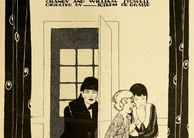Featured Article:Intersections of Gender, Race and Nation in Cloud Nine and M. Butterfly
By
2016, Vol. 8 No. 10 | pg. 1/2 | » AbstractThis article contributes to the debate as to whether Cloud Nine by Caryl Churchill and M. Butterfly by David Henry Hwang are ultimately essentialist or anti-essentialist, accentuating or disavowing difference. It argues that both plays are successfully anti-essentialist by examining the discursive relationship between categories of gendered, racial and national identity. For both Churchill and Hwang, categories of gender, race and nation can be mutually deconstructed in the same way that they are mutually constructed because their foundation in discourse is fundamentally unstable. Thus, when fluid sexuality – in the form of female sexuality and homosexuality – is used in these plays to undermine gender binaries, constructions of race and nation also start to come undone by implication. “One is not born a woman, but rather becomes one,” Simone de Beauvoir famously declared in The Second Sex (1949), leading Judith Butler to surmise in the opening pages of Gender Trouble (1990): “If one ‘is’ a woman, that is surely not all one is” (6). Butler disputes the notion that one “is” or “becomes” a woman by arguing that sex, as well as gender, is culturally constructed. However, she concedes that this is the case insofar as one enacts a gendered identity on the surface of the body through a stylized repetition of acts. Moreover, this must, by definition, intersect with other identity categories such as race and nation, which theorists such as Henry Louis Gates, Jr. and Edward Said have also claimed are socially constructed. Of course, the difference between de Beauvoir and Butler is that the latter benefits from the work done by Michel Foucault on discourse “as a series of discontinuous segments whose tactical function is neither uniform nor stable” (quoted in Wolfreys 67). In this context, gender, race and nation are socially constructed, or discursively produced, not in mutual exclusion but in mutual constitution. Foucault posits a world of discourse which is “a multiplicity of discursive elements that can come into play in various strategies.” (quoted in Wolfreys 67) One such strategy, as identified by Said, is that of self which is defined in opposition to Other.The purpose of this chapter is to examine intersections of gendered, racial and national identity in Caryl Churchill’s Cloud Nine and David Hwang’s M. Butterfly. It must be noted from the outset that concepts of race and nation are closely interwoven in these plays. However, according to Said, nation refers to the set of relations whereby one discursively produced historical and geographical entity exerts power over another. This occurs in much the same way as masculinity exerts power over femininity. In breaking down the binary categories of identity, these playwrights may be viewed as anticipating the transition from feminism to post-feminism.
Whereas according to Gates, race refers to the identity which is discursively produced through the body’s genealogy and/or biological features, such as skin colour and facial characteristics. This occurs in much the same way as gendered identity depends on the distinction between the male and female sexual body. In the context of Cloud Nine, this means that Clive’s masculinity is integral to his British nationality and his white English race. This identity is constructed in opposition to Betty’s femininity, as well as Joshua’s colonized nationality and black African race. Similarly in M. Butterfly, Gallimard’s masculinity is intrinsic to his French nationality and Caucasian race, defined in opposition to Song’s femininity, Chinese nationality and Asian race. I will argue here that in these plays, gender, race and nation are mutually constructed in discourse so that they may also be mutually deconstructed; this occurs through the subversive fluid sexuality at the heart of identity which undermines gendered categories of identity and, by implication, those of race and nation. Act One of Cloud Nine attempts to put forward a notion of self which is defined in opposition to the colonial/racial Other and the feminine Other through discourse. Played out against the backdrop of colonial Africa in the Victorian period, the third scene lies at the heart of this act and its structural centrality reflects its thematic centrality. In this scene, the natives are flogged for disobedience and afterwards Clive proposes cool drinks on the veranda. As everyone makes their way outside, he draws his wife Betty back. In his depiction here of the colonial Other and the feminine Other, Clive constructs his identity as white colonial administrator and paterfamilias; as such, he is an embodiment of the twin Victorian values of Empire and family which perpetuate categories of gender, race and nation. Regarding the colonial Other firstly, Clive says:
Thus, while the colonial Other is “wild,” “dangerous” and “implacable,” British identity is established in opposition as naturally having more humanity, rationality and civilization. The second threat to Clive’s identity takes the form of the feminine Other, or female sexuality, and he challenges Betty about her attraction to visiting explorer Harry Bagley. Clive’s depiction of female sexuality has strong resonances with his depiction of the colonial Other: “We must fight against it. We must resist this dark female lust, Betty, or it will swallow us up.” (34) In the same way that British identity is constructed in opposition to the colonial Other, a strong and powerful masculinity is asserted in opposition to a dark and destructive femininity. Moreover, as Howe-Kritzer states:
That is, within the dominant power structure, women are divided from other women as illustrated in Betty’s isolation from her mother Maud, the governess Ellen, and the visiting widow Mrs. Saunders. Similarly, Africans are divided from other Africans as illustrated in the servant Joshua’s rejection of his own family as “bad” people. Furthermore, the cross-casting of both Betty and Joshua shows how these characters are conflicted, not only in relation to other women and other Africans, but also within themselves. Above all, there is a tension between Joshua as the colonial Other and Betty as the feminine Other. The purpose of this fragmentation is to prevent an internal coalition against the white, British, patriarchal power structure embodied in Clive. (Howe-Kritzer 118) Of course, it was Joshua who informed Clive that he had seen Betty and Harry Bagley kissing. This, perhaps, is what is on Betty’s mind when she sees Joshua after her confrontation with Clive, and orders him to fetch her some blue thread from her sewing box. His response however, takes the form of a misogynistic slur on female sexuality: “You’ve got legs under that skirt,” he tells Betty, “And more than legs.” (35) It seems that the power struggle between black masculinity and white femininity is at an impasse until Edward intervenes on behalf of his mother:
A delighted Betty declares Edward “wonderful” and goes to embrace him. However, he moves away saying “Don’t touch me.” (35) This suggests that the role of white English patriarch – Edward’s social destiny – is not one he is altogether comfortable with. Of course, this is further illustrated in the fact that he is played by a female actress. But in the grand scheme of things, how he feels about the matter is inconsequential and thus, this little incident where he snubs his mother is glossed over. Instead, the scene closes with a song sung by all, whose repeated refrain underscores Edward’s duty to his family: “A boy’s best friend is his mother.” (35) Act One closes with the wedding scene which is supposed to contain the “deviant” sexualities of both Harry and Ellen, and sustain the future of the white patriarchal bloodline. In this way, order is restored through the family and by extension, the Empire. However, the tension between the colonial Other and the feminine Other runs like an undercurrent throughout this scene and culminates in their intersection. This, in turn, coincides with the overthrow of the dominant power structure as embodied in the figure of Clive. Jane Thomas summarises the complex and divisive web of power relations as being: “Though whites have power over blacks masculinity still prevails over femininity. While children are subject to adults they share the racial privileges of their fathers.” (174) In the wedding scene, the (performative) role of the feminine Other as adopted by Betty above, is displaced onto Edward who has taken a liking to Victoria’s doll. It is significant that Edward assumes the role of femininity here because it signifies the fluidity of sexuality which catalyses the whole chain of events. When Joshua sees him with the doll, he takes it from him, cuts it open and throws the mutilated toy under the wedding table. Thus, it is out of a desire for revenge that Edward subsequently attempts to lay the blame on Joshua for Betty’s missing necklace. “It was Joshua,” he claims, “Joshua took it.” (44) For a moment Clive appears to believe Edward, until Harry intervenes with the truth – that Edward took the necklace himself. Later that evening, Harry and his blushing bride Ellen are about to cut their wedding cake when the groom inadvertently steps on the mutilated doll under the table. However, because Edward had previously lied, Clive does not believe him when he insists (truthfully this time) that it was Joshua’s doing; instead father hits son across the head. Thus, when Clive proposes a toast to the happy couple and Joshua (who has been drinking steadily) points his gun at his master, Edward complies with the shooting by virtue of the fact that he knowingly looks on and does not act. In this way, through Edward and Joshua and the unity of the feminine and the colonial Other, an internal alliance forms against Clive at the very close of the act. It results in a symbolic shooting whereby the identity categories of the British Empire and white, English masculinity are simultaneously shattered. As Elaine Aston states:
Whereas in Cloud Nine the feminine Other and the colonial Other are initially represented as separate entities which gradually intersect, in M. Butterfly these identity categories interact from the outset so that a Western masculine self is defined in opposition to an Eastern feminine Other. Western culture is founded on this binary opposition and the play takes Puccini’s famous opera as a signal example. As a playwright, the project Hwang sets himself is that of “a deconstructivist Madama Butterfly” (86). In the original Broadway production, the idea of binary opposition is graphically present in performance through the permanent spatial image of a long tipped curved ramp which divides the stage in two halves. When Gallimard sees Song for the first time, she is enacting a scene from Puccini’s opera at a German ambassador’s house. Afterwards, she makes her way to the neutral space downstage where, outside of the binaries of Western culture, a contest for power ensues. Gallimard congratulates Song on her performance which he considers to have been “utterly convincing.” Song however, challenges the authenticity of a Chinese national playing a Japanese woman: “The Japanese used hundreds of our people for medical experiments during the war, you know. But I gather such an irony is lost on you.” (18) In a typically Orientalist move, Gallimard conflates China and Japan (and later Vietnam) and in so doing, he overlooks their very different cultures and histories. Rather, Song suggests that the real reason the opera appealed to Gallimard is because of its binary logic: “It’s one of your favourite fantasies, isn’t it? the submissive Oriental woman and the cruel white man.” (18) She proceeds to reverse the storyline so that a blonde homecoming queen falls hopelessly in love with a short Japanese businessman, and suggests: “Now I believe you would consider this girl to be a deranged idiot, correct? But because it’s an Oriental who kills herself for a Westerner – ah! – you find it beautiful.” (18) At a loss for words, Gallimard concedes: “Yes . . . well . . . I see your point.” (18) Having won this power struggle, Song invites him to visit Peking opera, some “real theatre” which will “expand” his mind. Presumably if Gallimard’s mind were expanded, he would know that Chinese theatre is transvestite theatre whereby female parts are played by male actors, and M. Butterfly in turn adopts this convention. Hwang specifies that “Song should unquestionably be played by an Asian actor, and preferably a man.” (88) As both Said and Gates attest, national and racial identity have a cultural collectiveness which necessitates, for Hwang, that Song should be played by an Asian actor. Whereas, as Butler has argued, gendered identity is purely discursive and this makes the issue of whether Song should be played by a man or a woman “somewhat more subtle.” (Hwang 89) In any case, Gallimard’s general ignorance on the subject of Chinese opera, as well as his wife’s, highlights the insular nature of Western culture. Intrigued by “this Chinese diva – this unwilling Butterfly,” after four weeks have passed, Gallimard takes Song up on her request and attends. Diva and Butterfly may appear to be two extremes, but as de Lauretis points out they are two extremes of the feminine. (315) That is, Gallimard takes Song’s female body as fact because when he first saw her she was wearing feminine clothing, when, of course, Song is male-bodied. Thus when he walks her home after the opera, it is significant that she is not in costume but in simple, baggy clothes which conceal the sexual body underneath. At length, they consider the marked fascination which Oriental women hold for Caucasian men:
In this way, Song herself draws attention to the instability of language and her comment about mutuality is typically enigmatic. On the one hand, she appears to be flirting with Gallimard who, in turn, is delighted that she considers him to be sexually attractive. On the other hand, Song is echoing the idea expressed by Said that the East willingly submitted to victimization and being “made” Oriental. (Said 6) This is precisely what Song proceeds to do, in order to take advantage of Gallimard and the sensitive political information he is privy to as French diplomat. After a series of short meetings which take place over a period of fifteen weeks, one evening Song invites Gallimard up to her apartment. She appears onstage in a twenties-style black gown and her typically feminine clothing comes complete with a typically Oriental identity; in this scene Song is noticeably more subdued and demure. Furthermore, this is a Western gown because the discourse of Orientalism is perpetuated by the West. Song acknowledges that there is a hint of danger and scandal in inviting Gallimard to her apartment. When he protests that this would not be the case in France, Song plays up the difference between France as “a country living in the modern era” and China as “a nation whose soul is firmly rooted two thousand years in the past.” (27) Consequently:
Thus, Song conveys the idea that China has a stable national essence and similarly, its people are essential selves whose actions are the direct result of a stable cause. Ultimately, it is this very cause which prompts Song to ask Gallimard to leave: “Hard as I try to be modern, to speak like a man, to hold a Western woman’s strong face up to my own . . . in the end, I fail. A small, frightened heart beats too quickly and gives me away. (27) Thus, in opposition to Song’s identity as “a Chinese girl,” “a modest girl,” Gallimard is for the first time labelled “a cad,” “a foreign devil.” (28) As Dorinne Kondo states: “Seeing Song supposedly revealed – paradoxically, in the moment of her greatest concealment – in her feminine / ‘Oriental’ inferiority, behaving with ‘appropriate’ submissiveness and docility, Gallimard for the first time finds his ‘true self’ as a ‘real man’ defined in opposition to Song.” (16/7) In both Cloud Nine and M. Butterfly, gendered, racial and national identity are represented as mutually constitutive in discourse because it is an unstable medium which presents the possibility of simultaneously breaking down these identity categories. The second act of Churchill’s play is set in modern-day London although the characters have aged only twenty-five years, and what begins as a sacred rite enacted by Victoria, Lin and Edward descends into a drunken orgy. In this way, through the fluidity of sexuality, all the binary oppositions presented in the play are broken down – between sobriety and drunkenness, past and present, life and death, husband and wife, brother and sister, man and woman, the colonized and the colonizer, self and Other. In the park in the middle of the night, Victoria takes the lead in attempting to summon the eternal feminine ruling principle:
The variety of names which exist for both goddess and god testifies to the instability of language and indeed all the signifying systems of Western culture; this includes the patriarchy which is put forward as divine will and the natural order. Victoria appeals to a time before this, when women were the original holders of power through sexuality and pro-creation. However, the solution is not simply to reverse the power structure from patriarchal to matriarchal because that means the gender binaries are still being upheld. Thus Mark Fortier states, “the invocation of archetypal womanliness, though compelling, is fraught with inevitable failure.” (79) Consequently, no goddess appears, only Victoria’s husband Martin who is followed swiftly by Lin’s dead brother, the British soldier. This illustrates the parallel disintegration of family and Empire, of gendered, racial and national categories of identity. Anxious to impose some meaning on his death, Lin asks her brother: “Have you come back to tell us something?” He merely responds: “No I’ve come for a fuck.” (76) As a soldier in Northern Ireland, Bill is “the inheritor of the Empire: bored, scared and ultimately dead, with no idea what he died for.” (Griffiths 56) Above all, he is sexually frustrated and this coincides with demise of the British Empire. The orgy ends with a greater resolve from Victoria, Lin and Edward to live together; in this way, a ménage-à-trois replaces the standard couple in a society which says that three is a crowd. The above scene ends with the song “Cloud Nine” from which the play takes its title. It tells the story of a utopian/distopian world in which all social codes of behaviour are transgressed and sexuality is fluid: “And it’s upside down when you reach Cloud Nine. Upside down when you reach Cloud Nine.” (78) For Griffiths, the play’s title and the placement of this song are “very important” because it constitutes “a false ending which demands that we practise complex seeing and make connections which the characters cannot.” (56) In particular, the feminine identity of Betty breaks down and is re-formulated so that she becomes more true to herself. Although the overarching power structure which puts forward identity categories remains in place, Betty herself cannot see this because she is constructed within culture. Hence she comes “to have a quiet sit in the sun,” and is re-visited by her mother Maud and by her children’s former governess Ellen. Predictably, Maud warns her daughter who has recently separated from Clive about the dangers of being “unprotected.” Although Betty protests that she has her own job and her own money, as doctor’s secretary, she is cast in a typically feminine position. On the other hand, Ellen re-appears to remind Betty of the oppressive influence she, in turn, had on her – Betty did not even acknowledge Ellen’s love when it was explicitly expressed. Yet for all that, sitting on the park bench, Betty admits the existence of her own sexuality which she has reclaimed for herself through masturbation:
For the first time in her life, Betty achieves a sense of self by asserting her independence from her mother and her husband through her sexuality. On the one hand, identity is fundamentally unstable and constructed through discursive language and culture. On the other hand, we need to achieve some sense of stability within language and culture in order to go about our daily lives. This is precisely what Betty manages to do. At face value, her monologue is “a celebration of her liberated identity through sexual and economic independence.” (Thomas 176) However as Thomas acknowledges, it is also more than this because Betty is not completely liberated and a dominating power still exists. In other words, in consciously defying Maud and Clive, Betty simultaneously acknowledges the power structure they represent and their influence on her. Of course, Betty’s heterosexual narrative is paralleled with the homosexual narrative of Edward and Gerry who, it is suggested, will reconcile.1 In this way, the fluidity of sexuality finds expression and results in the destruction of mutually constituted identity categories of gender, race and nation. Both Betty and Gerry have recently split from their long-term partners and sitting on the park bench, they swap stories on the simple pleasures of living for oneself. For Gerry, it is a matter of rising very early in the morning, whilst for Betty, it is a matter of listening to music in bed and having bread and lime pickle for supper. On the basis that “if there isn’t a right way to do things, you have to invent one” (86), Betty takes a leap of faith and invites Gerry to drop by her house. She learns however that the presumption of heterosexuality is false when he reveals that he is gay and, moreover, “rather involved” with her son. In this way, Gerry “outs” Edward to his own mother. However, the new Betty is accepting and recognises her adult children’s independence from her, just as she, in turn, has asserted her independence from Maud: “Well people always say it’s the mother’s fault but I don’t intend to start blaming myself. He seems perfectly happy.” (87) Gerry goes and Betty has a final visitor in Clive, who recognises that the eruption of fluid sexuality threatens concepts of race and nation as well as gender binaries. Hence, he rushes onstage for the first time in Act II to condemn the person she has become in traditional Victorian rhetoric:
Notions of masculinity and femininity, the white English race and the British Empire all intersect here only to be blown apart in a Wildean fashion. Thus Act II ends, like Act I, with a symbolic explosion involving Clive, or rather, the power structure he represents. Moreover, in the Betty-Betty embrace which follows, whilst Clive may say that she is “not that sort of woman,” Betty seems to affirm that she is. For Jane Thomas, this theatrical image is “an acknowledgement of the pervasive and inescapable nature of power. [...] The characters in Cloud Nine do not escape the operation of power; they merely succeed in changing the strategic situations they are in.” (177/9) Similarly, Mark Fortier says: “In this moment Churchill both addresses the continuing reality of patriarchy and its phallocentric economy and refuses to be overwhelmed by them.” (80) In other words, the fact remains that identity is constructed through language and culture, and that these mediums are utilized to section power. Paradoxically however, it is only by embracing her past and her past self that Betty can truly move forward. If, in Cloud Nine, gender, race and nation are represented as intersecting in language and culture in order to simultaneously break down and re-define these limiting identity categories, the same is true of M. Butterfly. In Hwang’s play, the standard association of masculinity with Westernism is symbolically disrupted in the figure of the “Chinese baby with blond hair” which the male-bodied Song and the infertile Gallimard seemingly produce. Over the course of years, their relationship settles into a routine whereby Song prepares Gallimard food, “pleasures” him, but mostly, by his own admission, simply listens to him talk about his life: “Perhaps there is nothing more rare than to find a woman who passionately listens.” (40)Continued on Next Page » Suggested Reading from Inquiries Journal
Inquiries Journal provides undergraduate and graduate students around the world a platform for the wide dissemination of academic work over a range of core disciplines. Representing the work of students from hundreds of institutions around the globe, Inquiries Journal's large database of academic articles is completely free. Learn more | Blog | Submit Latest in Theatre |













